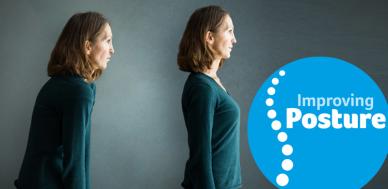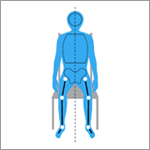Core muscles and your posture
Core stability muscles, or postural muscles, are the deep muscles in your abdomen, pelvis and back. They act to hold you together and help you maintain a good posture.

Posture is the way you hold yourself in sitting, standing or lying down.
'Good' posture allows movement with the least amount of strain and damage. 'Good' posture is sometimes described as 'back straight, shoulders back and tummy in'. In many respects this posture is good, but posture is about more than sitting or standing as straight as possible. Normally your body adopts many different postures in order to do different tasks and moving into different positions during the day helps you to remain flexible.
It is better to think of 'good' posture as a position in which you:
Posture only becomes 'bad' when it causes harm to your body or stops you doing everyday things. This may happen if you:
Most people have to work at keeping a good posture whether they have MS or not. If you have MS, you might find that muscle weakness, pain or fatigue makes keeping a good posture challenging. Poor posture can develop gradually, often without you noticing, until it interferes with everyday tasks or causes pain. It can then make other MS symptoms worse or harder to deal with.
Simple changes in posture can be beneficial and these can be incorporated into everyday activities. Changes are best done gradually and practised little and often. It is not always that easy to know if you are doing it correctly, so if any of the suggestions here make your symptoms worse, you should stop and consult a therapist.
If we sit, stand or lie in a poor posture for any length of time, it puts stress on our muscles, joints and ligaments. This can cause pain and damage, for example back, neck and shoulder ache. This can make your MS symptoms worse or harder to deal with. Fortunately, the reverse is also true. Improving your posture and strengthening your muscles can reduce the burden of some MS symptoms.
A good posture uses less energy - whether this is maintained by your muscles or by sitting in a supportive chair. Your core muscles in your abdomen work more efficiently if they are correctly aligned, which means they can support you and allow you to move your limbs more freely. If your body is comfortable, you are saving your energy for the movements you want to make. Good posture can therefore help with muscle weakness, pain and fatigue as well as ataxia (coordination problems), tremor, spasticity and spasms.
Good posture is especially important if you cannot move your body by yourself. Bad posture can lead to pressure sores developing. Try to ensure your carers understand good posture and can assist you to a well-aligned position.
In general, you are trying to keep your body aligned in a natural, symmetrical way. Think about keeping your 'spine in line' if you can.
It's often helpful to get some professional advice on your posture, especially if you have symptoms such as muscle weakness or spasms that can make maintaining your posture more difficult. An occupational therapist can assess your posture and give you personal tips on how to improve or equipment to support you.

We have a series of information films created with Occupational Therapist Wendy Hendrie. You can watch the films or read the articles below.